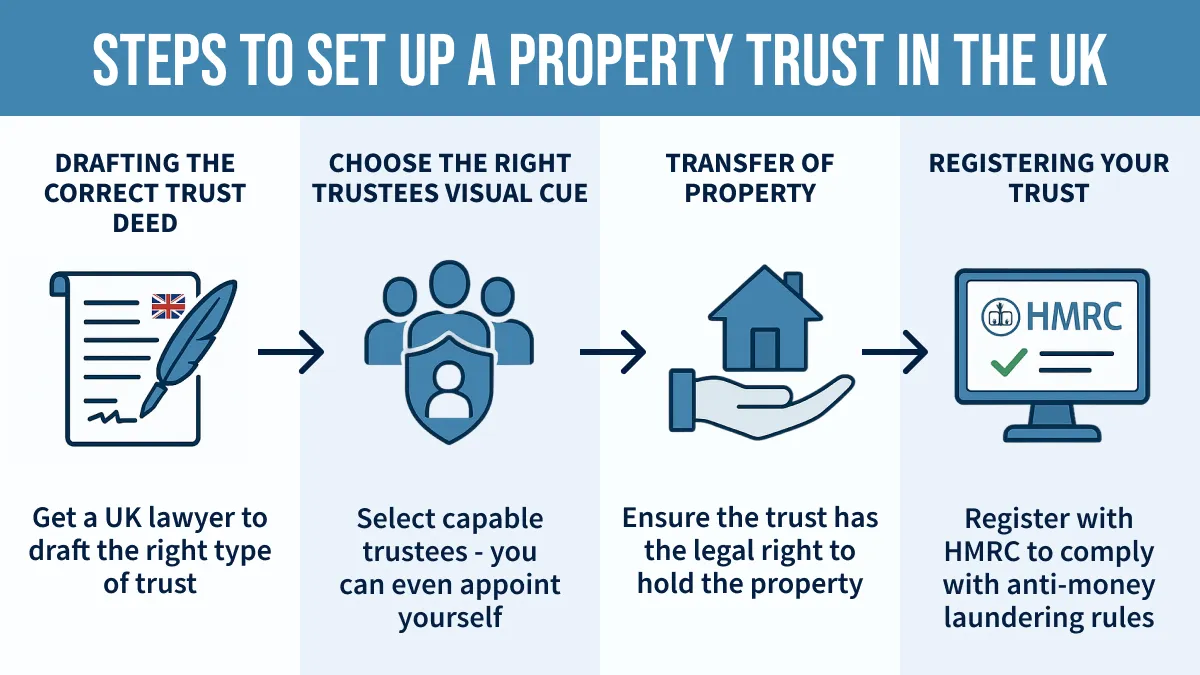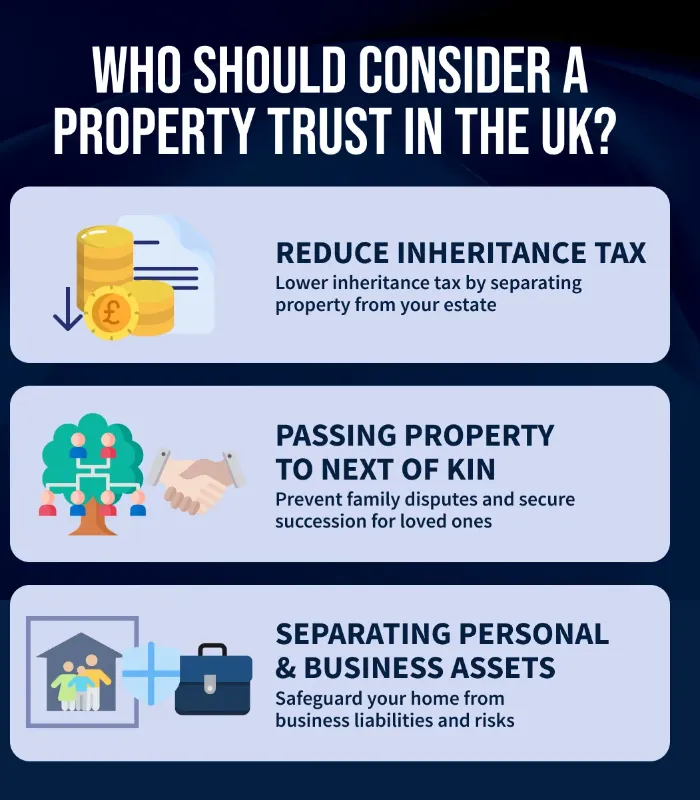- Selling
- Buying
- Landlords
- B&R Landlord hub
- Management services
- Vacant management
- Landlord reviews
- Rental investment
- Furnishing and refurbishment
- Renters’ Rights Act
- Yield calculator
- Free online valuation
- Stamp duty calculator
- ROI calculator
- Landlord resources
- EPC guide
- Video hub
- Area guides
- Fees for landlord
- Lettings Laws
- Why choose Benham and Reeves
- Renting
- New homes
- House prices
- International services
International offices
China, Hong Kong SAR, India, Indonesia, Malaysia, Middle East, Pakistan, Qatar, Singapore, Thailand and Turkey
Learn more - Contact
- News
- Contact
- About us
- My B&R
All you need to know about property trusts
- Advice clinic
- 29.10.25
- Vidhur Mehra
|
Getting your Trinity Audio player ready... |
Contents
- What is a property trust, and how will it help?
- How does a property trust work in the UK?
- What are the risks of setting up a property trust?
- Who should consider placing their properties in a trust?
- Do properties in a trust require professional management?
- When setting up a property trust, always consult with a professional
Properties in the UK can be held in different ownership structures, with the different types having their own pros and cons when it comes to tax, administration and control over the asset. Placing your property in a trust can offer many benefits, but you should be careful when setting it up, as it requires thoughtful tax planning and may not be suitable for everyone.
The UK’s Deputy Prime Minister, Angela Rayner, recently had to resign from her post due to a tax scandal arising from a property she had transferred to a trust set up for her son with disabilities. While this episode shows us how thorough and unbiased UK laws are, it also reveals how important it is to seek proper legal and financial advice when dealing with properties in a trust.
What is a property trust, and how will it help?

A property trust is a legal framework created to protect the interests of owners and their beneficiaries by clearly stating the terms of succession and shared property rights. Unlike individual ownership or company ownership, a trust requires a separate Trust Deed in which the trustees hold the property on behalf of its beneficiaries. Do read our detailed blog to learn more about what happens to properties left in a trust.
Creating a property trust is vital for estate planning and protecting family assets. It can have many benefits and is set up for different purposes.
- To simplify the transfer of ownership during major life events, such as death, divorce, or remarriage.
- Avoid delays and additional legal costs on death, as properties held in a trust may not require probate.
- Have more flexibility during transition periods with the ability to make changes as needed.
- Provide long-term security for children, grandchildren, spouses and other dependents.
- Prevent creditors from seizing the asset in debt or bankruptcy situations, as properties placed in a trust are no longer directly owned assets.
How does a property trust work in the UK?
A typical property trust consists of three primary entities.
- The settlor: The person who sets up the trust.
- The trustee: A single or multiple individuals (can include the settlor as well) to manage the property as per the term of the trust.
- The beneficiary: The person or people who stand to benefit from the trust agreement and gain future ownership or special rights to the property.
There are a few steps you need to follow when setting up a trust
i. Drafting the correct Trust Deed: You will need to seek the expertise of a practising UK lawyer to draft the type of trust you need correctly.
ii. Choose the right trustees: Make sure the person or people you appoint as trustees are capable of taking care of your property.
iii. Transfer of property: The trust must have the legal right to hold the property.
iv. Registering your trust: Every property trust in the UK must be registered with HMRC as per anti-money laundering laws.
What are the risks of setting up a property trust?
There are several things you should know about the limits of putting your property in a trust.
i. Limited control: When you put your property in a trust, you no longer own it directly. You may require the approval of other trustees to change the terms of the Trust Deed.
ii. Tax implications: Most of the time, people set up a trust to avoid paying the 40% inheritance tax (IHT) that comes with passing down property in an estate. But if the settlor dies within seven years of setting up the trust, the estate may still have to pay full IHT.
iii.10-year anniversary charge: If a trust consists of a property which is above the value of the IHT threshold, the trustee is liable to pay a charge which is calculated based on the net value of the property one day before the 10-year anniversary of the trust.
iv. Added costs and complexity: Setting up and managing a trust can involve legal fees and other associated costs every time there is a change or update needed to the terms.
All you need to know about Inheritance Tax (IHT)
Who should consider placing their properties in a trust?

Placing your property in a trust is a big decision that requires careful planning and thinking about different future possibilities. You can consider a property trust if your situation fits any of these:
- Reduce inheritance tax: Estates valued at above inheritance tax thresholds can reduce their liability by transferring property into a trust. Since the assets in the trust are now no longer a part of an individual’s directly owned estate, the IHT liability is reduced.
- Passing on property to next of kin: Creating a trust can help prevent disputes among family members that result from ambiguity about succession. This is particularly beneficial for complex family situations arising from divorces and remarriages.
- Separating personal and business assets: Properties in a trust are beneficial for those who have business liabilities and would like to safeguard their family home and private assets.
Do properties in a trust require professional management?
Properties placed in a trust have a more complex holding structure than those owned directly by an individual. If the trustees lack the professional expertise to manage a property, hiring a professional management company can be the right solution. Here’s how Benham and Reeves help manage properties placed in a trust.
- Legal paperwork: Backed by decades of experience and local knowledge, we make sure that your London property complies with the law by getting all the necessary safety certificates and operating licenses.
- Managing tenants and voids: From pre-tenancy preparations to post-tenancy checks, handling rental and deposit collections, and ensuring your property is safe during void periods, our one-stop lettings service takes care of everything.
- Repairs and maintenance: In addition to staying up to date with all utility bill payments and other administrative responsibilities, we will also keep your property in good shape by overseeing repairs and furnishing jobs.
- Tax services: It is common for many overseas landlords using trusts to register a company for ease of ownership and other tax benefits. We have a competent team to handle tax returns for such landlords holding properties in a limited company.
Why is it a good time to invest in a London property now?
When setting up a property trust, always consult with a professional

Property trusts can have complex legal structures intended to safeguard the interests of settlors and their beneficiaries. Therefore, they need to be correctly set up and protected by legal and financial experts. We recommend seeking professional counsel from competent lawyers, certified accountants, and qualified property experts.
We have 21 branches in London and 13 offices around the world to help you with all your property needs. If you want to know more about buying, selling, renting, or managing a home in London, get in touch with us.
This article is provided for general information purposes only and does not constitute legal advice. We are not legal experts, and readers should seek independent legal advice before making any decisions regarding property trusts.
Sign up to our newsletter
Subscribe
How much is your property worth?














